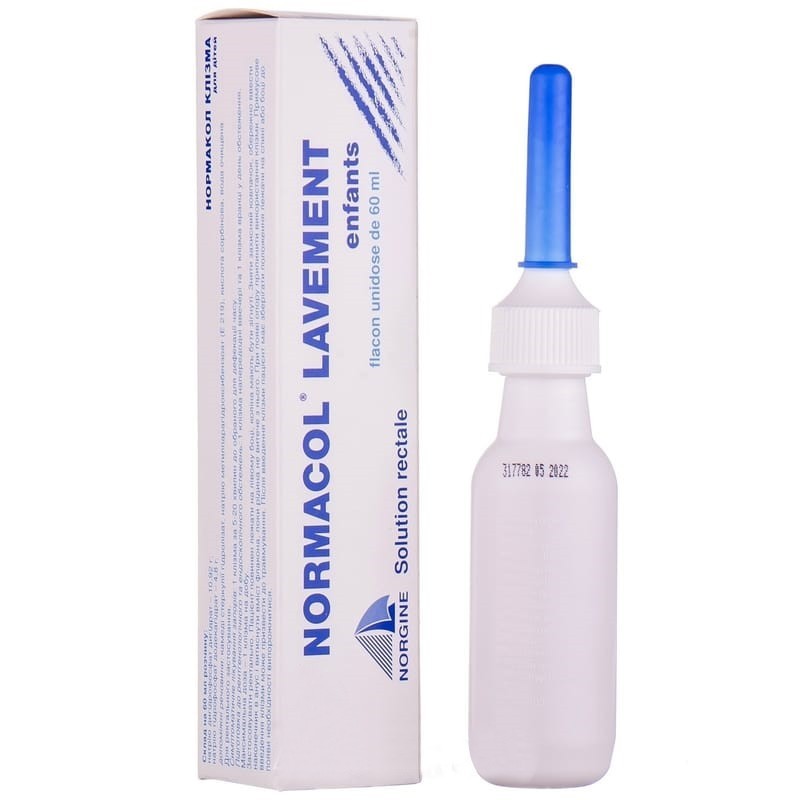



 Secure and encrypted payment processing
Secure and encrypted payment processing We ship to over 40 countries including the USA, UK, Europe, Australia and Japan
We ship to over 40 countries including the USA, UK, Europe, Australia and Japan Guaranteed refund or reship if you haven't received your order
Guaranteed refund or reship if you haven't received your orderWith the combination of mono- and disodium phosphates with a small amount of sterulium (plant) glue, a solution is formed whose pH does not irritate the intestinal mucosa. the use of a hypertonic enema promotes the flow of water into the intestinal lumen. moistened and softened feces increase in volume, stretching the walls of the large intestine, which leads to defecation in 5–20 minutes.
The components of the drug are not absorbed, not broken down. The drug is almost not absorbed, thus holding a large amount of water in the intestine.
Preparation for x-ray and endoscopic examinations of the rectosigmoid colon.
Symptomatic treatment of constipation in the lower intestine, especially due to difficult bowel movements.
Apply rectally.
Remove the protective cap, insert the tip into the anus and carefully squeeze out the contents of the vial.
After the enema is administered, the patient must maintain a supine or lateral position until the urge to defecate.
Symptomatic treatment of constipation: 1 enema 5–20 minutes before the selected time for bowel movement.
Preparation for x-ray and endoscopic examinations: 1 enema the night before and 1 enema in the morning on the day of the examination.
The maximum dose is 1 enema per day.
Hypersensitivity to the drug or any of its components.
Impaired electrolyte balance with sodium retention, congestive heart failure.
Intestinal obstruction.
Arrester.
Megacolon (congenital or acquired significant expansion of part or all of the colon).
Childrens age up to 15 years (enema 130 ml).
Childrens age up to 3 years (enema 60 ml).
Very rarely (1/10 000) such cases were noted:
The drug should be used with caution in the elderly and debilitated patients with impaired renal function, subject to a strict salt-free diet, since there is a risk of hyperphosphatemia, hypocalcemia, hypernatremic dehydration and acidosis.
Patients are advised to maintain an appropriate water balance.
It is not recommended to use the drug during exacerbation of hemorrhoids, in the presence of anal fissures or with ulcerative colitis.
The drug should be used with caution in the treatment of drugs that can affect the level of electrolytes (for example, diuretics, lithium, etc.), as a result of which there may be a risk of an increase in their effect.
An overdose in children can cause life-threatening disturbances in the water-electrolyte balance.
Long-term use is not recommended: if there is no effect when using the drug for 3 days, it is necessary to reconsider the treatment tactics.
The drug contains methyl parahydroxybenzoate (E219) and can provoke allergic reactions (possibly delayed type).
The drug contains sorbic acid and can provoke local skin reactions (dermatitis).
Normacol enema is a solution for rectal use.
During pregnancy and breastfeeding. Treatment of constipation during pregnancy is only possible with limited use of laxatives in enemas. For safety reasons, it is better not to use phosphate enemas.
During pregnancy and lactation, the drug is used only as directed by a doctor.
Children. Do not use in children under the age of 3 years.
In children aged 3-15 years, an enema of 130 ml is not used.
The ability to influence the reaction rate when driving vehicles and working with other mechanisms. Unknown
Use with caution in patients taking calcium channel blockers, diuretics, lithium, as well as other drugs that can affect electrolyte levels and cause hyperphosphatemia, hypocalcemia, hypokalemia, hypernatremic dehydration, acidosis.
Given that the drug is almost not absorbed, an overdose can only be accidental.
In case of accidental overdose, it is necessary to remove phosphates and take measures aimed at strengthening the general condition, correcting acidosis and electrolyte levels in blood serum, especially calcium.
At a temperature not exceeding 25 ° C.